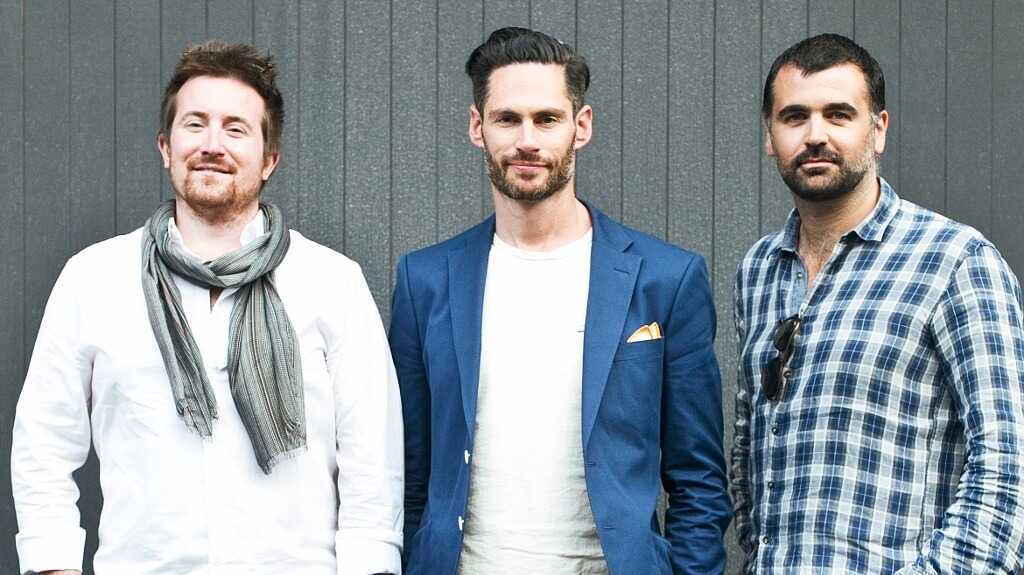How To Make A Successful Start-up: Do I Really Need An Office?
Serial entrepreneur Will Lebens (pictured middle) tried for years to get away from tired office formats of rows of desks, expensive locations and wasted time. He finally achieved it on the third time of asking.
Serial entrepreneur Will Lebens (pictured middle) tried for years to get away from tired office formats of rows of desks, expensive locations and wasted time. He finally achieved it on the third time of asking.
How To Make A Successful Start-up: Do I Really Need An Office?
Serial entrepreneur Will Lebens (pictured middle) tried for years to get away from tired office formats of rows of desks, expensive locations and wasted time. He finally achieved it on the third time of asking.

From my first exposure to ‘corporate’ culture at a Soho ad agency I couldn’t help feeling there was a more productive and efficient way to achieve what you need to in a typical work day.
At twenty four I left Adland in search of digital nirvana and started a “new media agency”; equipped with equal measures of enthusiasm, naivety and optimism about creating a better way to work.
We had our moments of innovative work culture and good retention, but we couldn’t shake the fact that as we grew we were ever more closely resembling the traditional large agency model - because ultimately we were shaping ourselves to be acquired by one. And we were…. which was a disaster for all the reasons we wanted to set up independently in the first place.
So I left, set up a brand new agency, and did exactly the same thing all over again.
"We had just spent three years of our earn out commuting to an enormous central London office complex, which was universally despised by us and our staff"
In hindsight I hadn’t understood the pattern we were observing because working techniques, habits and environment are things that take shape almost of their own accord unless you actively intervene.
By the time we were ready to extract ourselves from the corporate bosom for the second time and embark on a new venture, we had a singular obsession. Beyond the brilliance of our engineers, the uniqueness of our technology or the magnetism of our brand, there was one thing we were determined to get right this time: our working environment.
We had just spent three years of our earn out commuting to an enormous central London office complex, which was universally despised by us and our staff for many reasons.
Now we were determined to create a flexible work environment that people could aspire to because it fitted into their lifestyle. In fact, we had to in order to build a competitive advantage and attract the talent we needed for our new venture.
There were a number of key principles informing our decision:
● The best talent in our industry is not a 1hr commute from central London (and those who are have better things to do with their time).
● Two hours ‘dead time’ a day equates to more than a full working day each week, plus it's bad for the environment. If we could claw back even a fraction of that, it would benefit everyone
● Open plan office environments are not conducive to work that requires concentration - such as coding
● The repetitive routine of office working is enough to drive most people insane - as we had witnessed first hand
As a business owner, giving up the office sounds like a scary thing to do, and it is. Taking the leap was the result of many protracted discussions between myself and my partners. But in the two and a half years since we started DADI+, I can honestly say hand on heart, making it a remote working business was one of the smartest decisions we have made.
The business is twice as profitable as the best year of our previous business; our staff retention record is higher; and our teams are more engaged and more motivated.
Obviously there are a number of contributing factors but I believe that the decision to operate our business remotely has been the most important.
That said, it’s not for everyone. The industry and working practices can feel like they dictate the necessity to have an office, often for good reasons. But they are worth scrutinising in relation to the specific needs of your business and culture.
Do you have to have physical stand ups? How flexible are your clients about meeting locations? What are the advantages of having all your staff in one place? And the disadvantages?
In many cases - especially when starting a business from scratch - removing the overhead and substituting it with smart technologies can make a lot of sense:
● Hard cash - we were spending over £10k p/m on fancy open plan offices in our old business. Add in utilities and extras and it was topping £150k a year, a significant saving for a start-up.
● Talent pool - as we no longer have to employ people within a commute of London, our potential talent pool is now global. Our last three recruits have been in the USA, Hungary & Taiwan.
● No ‘dead’ commute time - whether this is used to lie in for an extra hour or to prep for the day ahead it’s still a saving.
If you are considering remote working here are a few pointers worth keeping in mind:
1. Live in the cloud
There are countless tools out there that facilitate remote working, either by replicating traditional office practices or improving on them. Some of our favourites include:
● Slack for messaging
● Github for collaboration
● Speek for meetings
● Xero for accounting
● Google Drive & Dropbox for document sharing
● Droplr for file transfer
2. Think about staff happiness
One of our major concerns with remote working was the lack of face time we would get with everyone. So we made it a priority to put in place a system which considers staff wellbeing. Were people getting out enough? Were they disciplined enough to stop working and avoid burnout? Were they getting enough holidays and exercise?
We wanted to address concerns on an individual basis without people feeling like we were prying. Our approach was to create a new role which we called Head of Happiness, who was responsible for ensuring all of the above in a non-HR-y way.
3. You still need a company culture
Actually it’s more important than ever. That’s why we invest in monthly meet ups as social gatherings, work-out Wednesdays, and epic annual Weekenders where all DADIs and their families congregate - to foster and nurture a distinctive culture. So no matter where you’re working you feel connected and part of a community.
Whether or not remote working suits your business comes down to the type of business you want to build. Undoubtedly there are pros and cons and sometimes practical barriers, but remote working continues to be a cornerstone in the success of our business and in my opinion deserves serious consideration.
Thanks for signing up to Minutehack alerts.
Brilliant editorials heading your way soon.
Okay, Thanks!




